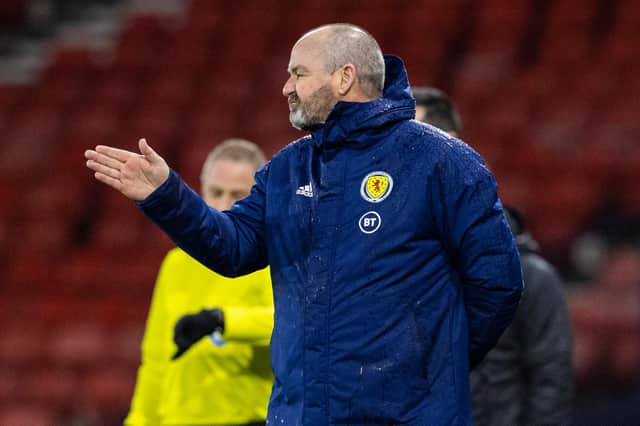Dog-eat-dog group, Scott McTominay, Stephen O'Donnell - Steve Clarke discusses next steps for Scotland


The Scots need to buck a trend where they have failed to qualify for the last five World Cups after dropping points in their opening home fixture. This worrying statistic was lost slightly in the afterglow of Scotland securing a point against Austria with a goal as fine as the one John McGinn produced with five minutes remaining.
The Scotland manager gave a typically Clarke-esque assessment of its aesthetic qualities. “It was a good goal because it got us a point,” he said afterwards. It certainly got Scotland out of a hole. Losing an opening home match to a rival is undoubtedly not a recipe for success. Clarke would have struggled to persuade fans that Scotland’s qualification hopes remained on track had they kicked-off with a defeat.
Advertisement
Hide AdAdvertisement
Hide AdHe did briefly join in with the hysteria surrounding the manner in which Scotland scored their second equaliser – well, it would have been rude not to. Clarke remembered being in the squad if not on the pitch when Mo Johnston scored an equally spectacular goal to put Scotland ahead in a World Cup qualifier against Cyprus in April 1989. That campaign was a rare instance of the Scots dropping points in their opening home game – a 1-1 draw against Yugoslavia – and still qualifying.
A win in Norway, one of Scotland’s rivals, helped, as did a home victory over France – when Johnston also distinguished himself. Yugoslavia ended up topping the group with Scotland progressing in second place, a point above the French. The away win in Oslo at the start of the campaign proved critical. Inflicting such an early blow on one of their potential rivals is what Scotland will have to do in Tel Aviv tomorrow night.
It is a potentially pivotal clash against opponents we know are very much Scotland’s equals and will be a test of both sides’ powers of recovery. Israel are already playing catch-up after losing at home to top seeds Denmark.
Make or break you
“That’s the nature of the qualification games,” said Clarke. “You have three games in a week. It can make or break you. Hopefully it is going to make us.
“It is not about eliminating Israel,” he added. “I know the clamour is to get the points but the key for us is to try and build on the performance against a really good Austria side. It got us a point, we wanted three. Now if we can go to Israel and get three points that would be a good return after two tough games.”
What Clarke desires is for teams to cannibalise each other. For this to work to Scotland’s benefit means Clarke’s side must produce a couple of eye-opening results at least. A victory at the home of Hapoel Tel Aviv would count as that.
No Belgium or Russia
“I think I said at the start when the group was drawn I can see teams dropping points against each other all the way through this,” observed Clarke.
“I don’t see a Belgium for example taking thirty points or a Russia who I think took 24 points – 54 points went to the top two seeds last time. I don’t see that happening now. I think it will be a competitive group all the way through with a lot of twists and turns.”
Advertisement
Hide AdAdvertisement
Hide AdClarke does not envisage making wholesale changes ahead of tomorrow’s clash. There may be a case to start Che Adams after the Southampton striker impressed during his 25 minute-appearance off the bench, either as foil for Lyndon Dykes or a direct replacement for the hard-working striker.
“He gives us a good option,” said Clarke. “Lyndon is a physical player, he knocks them around a bit and works his socks off and obviously starts to fatigue a little bit towards the end. So if we can put on someone like Che it gives us another option. He is going to make the squad better, he is going to make the team better.”
Clarke knows where improvement is needed. Scoring twice at home would normally be expected to be enough to secure all three points. That did not happen. The goals Scotland conceded were avoidable. Jack Hendry, otherwise steady, was close to the action but not close enough on both occasions.
Clarke earned six caps over seven years and knows how difficult it is to hit the ground running at international level – after winning five caps in a matter of months between 1987 and 1988, it took him another six years to win his sixth and final cap in 1994.
No switch for Scott
“I think it was probably more difficult for Jack because he has had fewer caps," said Clarke. "Grant Hanley comes in and he’s already played 29 times – for him to come back in was a lot easier.”
There might be changes in defence though this won’t involve Scott McTominay moving back into a back three. He continued his impressive Manchester United form in his preferred position of midfield.
“It was a good change,” said Clarke.
Stephen O’Donnell’s duel with David Alaba was a fascinating locking of horns between representatives of Motherwell and Bayern Munich. Alaba was given something to think about and O’Donnell trumped his opposite man when it came to assists. The Motherwell played delivered the deep free kick that saw Hanley score Scotland’s first equaliser. O’Donnell has become something of an international stalwart under Clarke and seems as likely as anyone to retain his place tomorrow night.
“I am glad someone noticed,” said Clarke. “I thought he was really good. Sometimes his decision making in forward areas could be a little bit better, but he is improving all the time. And certainly, for me, he is a good international player and always does well for his country.”